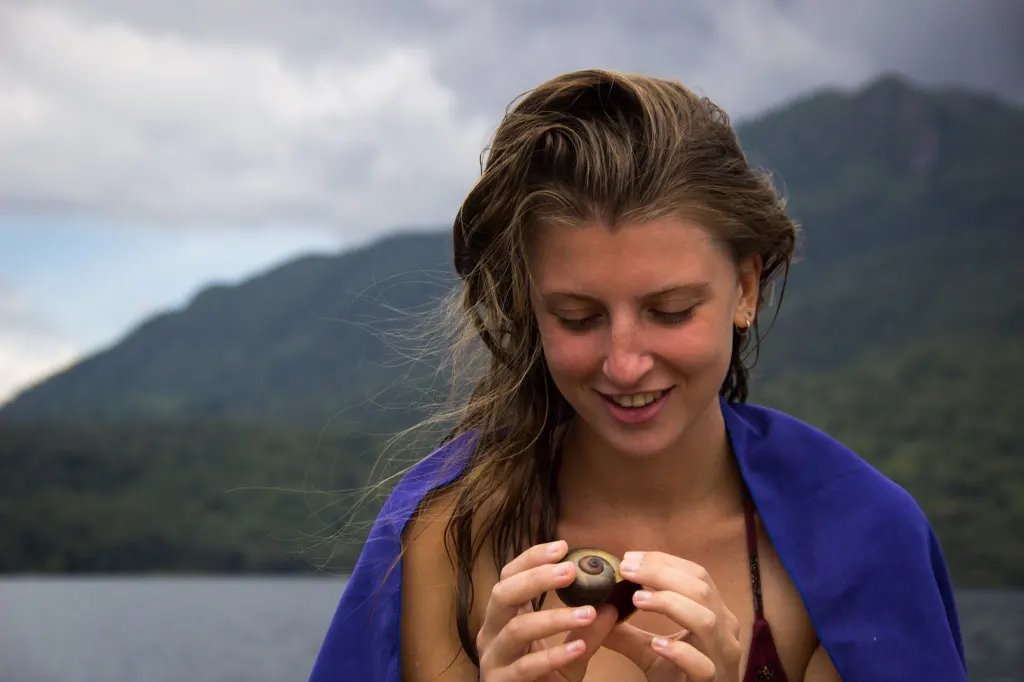Capucine Chandon (26, based in Denmark) considers herself a European citizen, as she has lived in a few different countries already. With a background in Communication and Photojournalism, she has put all her focus on her passion for bringing people together in nature.
Capucine was selected for the project “European Youth at the frontlines of active citizenship: A Roadmap towards a collective South-North-East-West Momentum” organized by Volunteers Centre Skopje and supported by European Commission due to Erasmus+ European Youth Together programme.

What are you working on with your project “Biophilia”?
– Biophilia means love of life and living organisms. It describes the need as a human being to connect with other forms of life in nature in order to feel good. Instinctively, we seek connection with the world around us: with plants, trees, animals, mushrooms… My idea with this project is to invite people to reconnect with nature. I organize events where people meet up in nature somewhere around Aarhus. Every season brings a different nature experience and activity: it could be going on a hike, gathering wild edible plants or mushrooms, and cooking them on the fire, swimming in a lake or the sea, and sleeping outside. We are observing and experiencing nature. In a way, it’s a very resourceful, restorative, therapeutic practice.
Who goes to your events?
– I started by creating a group on Facebook, inviting my friends to spend some time together in nature. The group quickly grew bigger and now mainly consists of young, international people living in Aarhus who have an interest in re-connecting with nature. Having a community of people with the same interest, members can find support, share skills and knowledge, propose an activity, and organize their own events in nature if they want to.
What do you do in nature? How do you facilitate the events?
– One of the first events was a “forest bath”, where we did a meditative walk in nature. Forest bathing is a mindfulness practice. We started by doing a few grounding and breathing exercises, and then we went for a silent walk in nature to reconnect with our physical senses: touching, seeing, hearing, smelling, tasting, literally bathing in the nature all around us. At our last event, we took a bus from Aarhus to Silkeborg and then walked for 19km in the forest and countryside. We collected wild berries, plant sand mushrooms along the way. We then arrived at a base camp in the forest, next to a lake, where we went swimming. We cooked some food on the fire and relaxed until the evening. It was truly beautiful to hear everyone singing a song in their own language – out of 10 people, we were 7 different nationalities! Sleeping together is such a strong element of a nature trip. The next day, I could feel that the energy of the group was remarkably different. Spending a full day and night in nature unites the people on a deeper level.
Why did you want to do this project?
– In the cities, humans have a tendency of becoming self-centered. We surround ourselves solely with human thinking and design. Spending time in nature, we realize that humans are not more important than other types of life, but part of a much bigger cycle – the circle of life. When I swim in a lake or in the ocean, my whole body being completely submerged in water, I have the feeling of being taken care of. It truly brings me back home. I feel purified, cleaned from all my worries and fears. Spending time in nature allows us to reconnect to our inner wisdom on an emotional, spiritual, and energetic level. The regenerative power of nature helps us to relax and find inner peace, especially when we are silent. Sitting around the fire brings back a completely ancestral feeling of community, and oneness with nature. We come back to our roots, our origins, where we come from. It’s coming home.
Capucine Chandon

